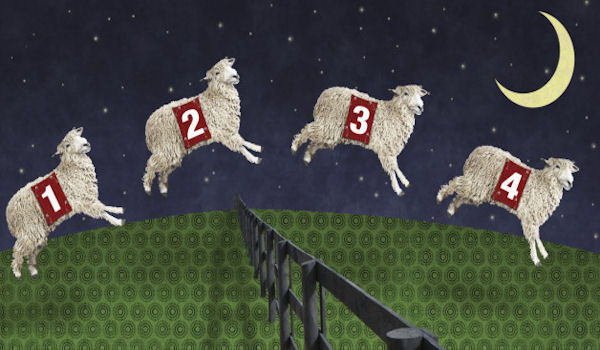3rd June 2016
Contributing writer for Wake Up World
It would seem that sleep should come easily and naturally; it should be as elementary as breathing. But unfortunately, getting a good night’s sleep is a challenge for many of us. In fact, the inability to get a good restorative sleep has become such an epidemic that there are countless websites, books, sleep clinics, smartphone and tablet apps, OTC sleep aids, and of course pharmaceuticals, all designed to induce sleep, some naturally and some artificially.
A recent survey study revealed that as many as: “… 43% of Americans between the ages of 13 and 64 say they rarely or never get a good night’s sleep on weeknights. More than half (60%) say that they experience a sleep problem every night or almost every night (i.e., snoring, waking in the night, waking up too early, or feeling un-refreshed when they get up in the morning.)”
Even more alarming is that an estimated 70 million Americans are currently being ‘treated’ for sleep disorders with prescription pharmaceuticals.
I don’t know about you, but I certainly find this extremely disturbing!
Why has this happened?
One word – STRESS!
Sleep, stress and inflammation
Stress can be the result of improper physical movement or lack thereof, poor dietary choices, and of course emotional or mental distress. An effect of prolonged stress in any of these areas results in chronic inflammation in the body, which eventually affects the three main components of health: physical, nutritional and emotional.
A 2010 study published in Best Pract Res Clin Endocrinol Metab set out to determine how sleep loss affects mediators of inflammation:
“Controlled, experimental studies on the effects of acute sleep loss in humans have shown that mediators of inflammation are altered by sleep loss. Elevations in these mediators have been found to occur in healthy, rigorously screened individuals undergoing experimental vigils of more than 24 hours, and have also been seen in response to various durations of sleep restricted to between 25 and 50% of a normal 8 hour sleep amount.”
Further confirming the link between sleep loss and inflammation is another study from Emory University School of Medicine:
“Individuals who reported six or fewer hours of sleep had higher levels of three inflammatory markers: fibrinogen, IL-6 and C-reactive protein. In particular, average C-reactive protein levels were about 25 percent higher (2 milligrams per liter compared to 1.6) in people who reported fewer than six hours of sleep, compared to those reporting between six and nine hours.
That difference was still significant even when the data is corrected for known risk factors such as smoking, blood pressure, diabetes and obesity…”
The C-reactive protein test is used extensively as a marker of inflammation which is the most common determinant of the risk of disease (or active disease) such as heart disease, autoimmune, infection and cancer.
There have also been numerous studies proving that a lack of sleep affects mood, productivity and food and exercise choices. But are these studies really necessary? It seems to me that this is a logical no-brainer. A restful night’s sleep is something we all need on a regular basis to maintain optimal health. And it’s even more vital if you are currently experiencing an adverse health condition.
The quality of our sleep is also important. Although pharmaceuticals, OTC drugs and even alcohol can make you to fall asleep, the use of these substances as ‘sleep aids’ decrease the quality of sleep, and many of their side-effects pose just as great a risk to your health, or greater, as sleep deprivation itself. Most importantly, none of them address the root cause of the problem.
If you are experiencing symptoms of stress, it is vital that you honestly examine your life to determine the root cause(s) and take steps to address them.
The body requires sleep to:
Restore what may have been lost throughout the day so as to keep your immune system operating efficiently. (This is especially important when under stress.)
Repair any tissue damage, help to calm the nerves, and to maintain brain plasticity (the brain’s ability to change throughout life) which is vital for learning and memory.
Rejuvenate your mind, body and soul. Sleeping recharges you so that you can view your daily activities with fresh eyes which often results in the resolution of any conflicts you may be experiencing. The saying, “let me sleep on it” is a very wise one. Research has shown that sleep deprivation not only slows your thinking process, but also impairs judgment and focus, and can significantly throw your emotions off balance.
So what can you do if you are having difficulty falling asleep and/or staying asleep? In both cases, you need to lower the level of inflammation in the body, by lowering its stress levels.
Here are a few things that can help bring about a good nights slumber:
Deep Breathing will help to oxygenate the body, reduce stress, and remove toxins and waste from your lymphatic system.
Stay hydrated! Water is vital for life and stress is a major contributor to dehydration. And did you know that dehydration has been linked to poor sleep? Increasing water consumption throughout the day will help you to fall sleep quickly and stay asleep through the night.
Turn off the television and other electronic devices before getting ready to sleep! This is a tough one for many! Admittedly I enjoy falling asleep with the TV on, especially after the occasional stressful day. With that said, all electronic devices emit an underlying blue light that affects the natural melatonin that is released as your body recognizes the darkness of night. So it would be advisable to pick up a book or magazine rather than a smartphone or tablet. Better yet, perhaps use this time to pick up your journal and jot down and release any emotions you may be carrying from the day’s events. If you truly feel the need to turn on the TV, consider using the timer so that it shuts off within 30 minutes or so.
Sounds of nature. Many people swear by the use of sound to help lull them to sleep. But of course, whether sounds of nature or “white noise,” there is controversy. Subtle sounds of nature are actually very subjective. For example, I find the sound of ocean waves at night to be very relaxing and the sound of crickets chirping quite annoying. Yet I know people who swear by these chirps to induce their sleep. How about the sounds of geese honking? I could easily fall asleep to that while many would rather hear a symphony of car horns instead.
The point is, when choosing nature sounds to help you sleep, remember that what is soothing to some may be quite disturbing to others.
Now, what about white noise?
I truly thought that white noise was in the same category as nature sounds considering that the sound of a waterfall is very similar. However, I never found white noise to be calming and now there is some research shedding some light as to why this might be. (It might even explain those annoying crickets!)
Here’s an excerpt from an interesting article published in Scientific American:
“Several studies have indicated that stress resulting from ongoing white noise can induce the release of cortisol, a hormone that helps to restore homeostasis in the body after a bad experience. Excess cortisol impairs function in the prefrontal cortex—an emotional learning center that helps to regulate ‘executive’ functions such as planning, reasoning and impulse control. Some recent evidence indicates that the prefrontal cortex also stores short-term memories. Changes to this region, therefore, may disrupt a person’s capacity to think clearly and to retain information.
Though not definitive, recent research also suggests that noise-induced stress may decrease dopamine availability in the prefrontal cortex, where the hormone controls the flow of information from other parts of the body. Stress resulting from background noise, then, may decrease higher brain function, impairing learning and memory.”
Did you know there is also pink noise and brown noise? It’s true! Both are similar to white noise only varying in frequency.
When it comes to sound, what is stress-inducing for you may be stress-relieving for me. Not all sounds are created equal. White, pink or brown noise, or even crickets, may cause stress in some and a restful night sleep in others.
There is no data addressing how you should “feel” when trying to fall asleep so the bottom line is that you must use your own common sense. If you find something that helps you sleep and you wake up rested and energized, then stick with it!
Magnesium, the calming mineral.
Magnesium, also known as the calming mineral, is recognized as one of the most deficient micronutrients in Americans today along with Vitamin D3 and Vitamin B12. (For more information, please see: Magnesium: An Invisible Deficiency That Could Be Harming Your Health.) So is it any wonder that a magnesium deficiency also contributes to stress and chronic inflammation levels in the body? See a pattern developing here?
A 2012 study published in J Res Med Sci found:
“Supplementation of magnesium appears to improve subjective measures of insomnia such as ISI score, sleep efficiency, sleep time and sleep onset latency, early morning awakening, and likewise, insomnia objective measures such as concentration of serum renin, melatonin, and serum cortisol, in elderly people.”
Of course, it isn’t only the elderly who suffer from sleep issues.
Other health conditions associated with a magnesium deficiency include; Heartburn, Anxiety, Headaches, Depression, Heart disease, High blood pressure, Chronic Pain Syndromes, Autoimmune Disorders, Multiple Sclerosis.
What about 5-HTP and L-Tryptophan?
L-Tryptophan is an essential amino acid — meaning it is not produced by the body so we must get it from food — from which your body produces neurotransmitters 5-HTP, serotonin and melatonin. It is broken down like this: L-Tryptophan > 5-HTP > Serotonin > Melatonin.
Many believe that 5-HTP is more effective at raising serotonin levels in the body because it is the direct precursor to serotonin and can cross the brain blood barrier (BBB). Though this is partially true, serotonin levels within the brain have also been shown to increase with L-tryptophan. However, the problem with L-tryptophan is that it must compete with other amino acids for passage through the BBB as well as other biochemical processes such as creating vitamin B3 and niacin. Fortunately there is a simple solution. Take tryptophan on an empty stomach or with a carbohydrate. 5-HTP on the other hand should be taken with food to help prevent stomach upset.
Research suggests both L-Tryptophan and 5-HTP can significantly help with insomnia, but my personal choice is L-tryptophan. I find it to be a safer choice since it is an essential amino acid, a nutrient — in other words, we require it for our health — whereas 5-HTP was created as a shortcut to serotonin, much like SSRI pharmaceuticals. It is also important to keep in mind that both should be used with caution, especially at higher levels.
Years ago there was an outbreak of eosinophilic myalgia syndrome (EMS), a potentially serious illness, and it was linked to the use of L-tryptophan. EMS was not caused by the amino acid itself, but by impurities found in the supplement during manufacturing, and thus L-tryptophan was banned by the FDA in 1989.
It’s important to note that since the ban was lifted in 2001, there have been no additional occurrences.
“The EMS outbreak prompted the United States Food and Drug Administration (FDA) to place a ban on all over-the-counter uses of tryptophan supplements, allowing only limited regulated use of tryptophan produced by United States manufacturers. Following the identification of the source of the outbreak, the ban was lifted in 2001. Since then, numerous research and clinical trials have been conducted without incident.”
Another interesting article about L-tryptophan was published by Life Extension Magazine in 2008. Entitled The FDA’s Cruel Hoax, it looks at the FDA’s banning of L-tryptophan and the concurrent rise of expensive prescription drugs in its place.
Foods and herbs for a restful sleep.
I have personally taken L-tryptophan supplements with much success. As always make sure the company you buy your supplement from is certified and contains the Good Manufacturing Practice (GMP) stamp. This is to ensure that you are buying quality supplements free from any impurities.
Foods that contain L-Tryptophan include: Nuts, Seeds, Dates, Cheese, Red meat, Chicken, Turkey, Fish, Oats, Beans, Lentils, Peanuts, Yogurt, Eggs and Oats.
Another option for naturally inducing sleep is to wind down with a calming cup of tea in the evening. Herbal tea blends have been safely used for centuries to calm nerves, reduce anxiety and induce a restorative sleep. A warming sip prior to bedtime brings comfort to both the body and mind and is a great way to begin the process of winding down after a long day.
Herbs commonly found in calming tea blends include: Chamomile, Valerian Root, Skullcap, Passionflower and Lavender.
Bedtime.
Stay calm: Worrying about sleep in itself can cause insomnia, so try to maintain a calm and positive attitude in the evening hours. Allow yourself to be patient as you work toward restful slumber.
We encourage bedtime rituals for our kids, but we could also benefit from establishing an evening protocol as well.
When establishing a consistent bedtime routine, consider incorporating the following: Warm baths, Deep breathing, Stretching, Lighter evening meals, White noise, Calming sounds, No electronics, Low lighting (especially during the hour leading up to bedtime) and other relaxation techniques that work best for you.
About the author:

 Dr. Michelle Kmiec is a chiropractic physician who also holds a Bachelor of Science degree in Human Biology, and a minor in Medical Research. She is a life-long athlete who after curing herself 100% naturally from MS and chronic anxiety, became an avid nutrition and health researcher and advocate.
Dr. Michelle Kmiec is a chiropractic physician who also holds a Bachelor of Science degree in Human Biology, and a minor in Medical Research. She is a life-long athlete who after curing herself 100% naturally from MS and chronic anxiety, became an avid nutrition and health researcher and advocate.
The founder of the website OnlineHolisticHealth.com and author of “Healthcare Freedom Revolution: Exposing the Lies, Deceit and Greed of the Medical Profession“, Dr. Kmiec has been featured in many health magazines and websites, and has been a guest on radio talk shows in the USA, Canada, United Kingdom, and Australia.
For more information, visit OnlineHolisticHealth.com or connect with Dr. Michelle Kmiec on Facebook, Twitter and LinkedIn.
Previous articles by Dr. Michelle Kmiec:
- Could Glutathione Be the Key to Slowing the Physical Aging Process?
- Serrapeptase: an Enzyme That Treats Inflammation, Arthritis, Scar Tissue and More
- Are Your Thoughts and Beliefs Really Yours?
- The Truth About Insomnia, Depression and Anxiety
- Natural Cure for Depression Silenced?
- The Link Between Stress and Intestinal Parasites – and What to Do About Them
- Arthritis Cure Found in Nature
- The Sun & Skin Cancer: the Truths, Pseudo-Truths & Lies of Mainstream Science
- A Natural Cure for Migraines
- Natural Cure for Chronic Pain Syndromes Silenced by the Medical Establishment
- Fluoride Linked to Coronary Heart Disease
Please note: This article is not intended to provide medical advice, diagnosis or treatment.
Source Article from http://wakeup-world.com/2016/06/03/are-you-getting-a-good-nights-sleep-natural-approaches-to-restorative-sleep/
 RSS Feed
RSS Feed















 June 2nd, 2016
June 2nd, 2016  Awake Goy
Awake Goy 



 Posted in
Posted in  Tags:
Tags: 













